Select Works on Reformed Symbolics (14 vols.)
Digital Logos Edition
This product has been transferred from Community Pricing to Pre-Pub. The actual funding level may be lower than it appears, which could delay production. The amount of funding still needed will be evaluated and updated soon.
Overview
Deepen your understanding of Reformed ecclesiology, doctrinal theology, and the development of its creeds and confessions. In these 14 volumes, you’ll find historical and theological commentary on the major Reformed statements of faith, as well as scholarly analysis on their historical importance and contemporary relevance. Featuring Abraham Kuyper, Philip Schaff, and other distinguished Reformed theologians—the Select Works of Reformed Symbolics Collection will expand your knowledge of how Reformed theology has been formally expressed throughout history.
Looking for more on Reformed confessions and creeds? Check out Select Works on the Westminster Assembly (32 vols.)
- Presents extensive arguments for and against the use of creeds and confessions in the Reformed tradition
- Includes a large collection of primary-source documents from the Reformation
- Provides a historical perspective on the nature and use of the creeds and confessions
- Title: Select Works on Reformed Symbolics
- Volumes: 14
- Pages: 4,352
- Creeds and Confessions: The Reformation and Its Ecumenical Implications by Erik Routley
- The Implications of Public Confession by Abraham Kuyper
- Confessions of Faith and Formulas of Subscription in the Reformed Churches of Great Britain and Ireland Especially in the Church of Scotland by James Cooper
- The Creeds and Platforms of Congregationalism by Williston Walker
- Symbolism or Exposition of the Doctrinal Differences between Catholics and Protestants by John Adam Moehler
- Documents Illustrative of the Continental Reformation by B. J. Kidd
- The History, Constitution, Rules of Discipline, and Confession of Faith of the Calvinistic Methodists in Wales
- The Harmony of the Reformed Confessions by Philip Schaff
- The Law of Creeds in Scotland : A Treatise on the Legal Relation of Churches in Scotland by Alexander T. Innes
- Uses of the Creeds and Confessions of Faith by William Dunlop
- The Harmony of Protestant Confessions by Peter Hall
- The Utility and Importance of Creeds and Confessions by Samuel Miller
- An Essay on the Origin, Character, and Tendency of Creeds and Confessions of Faith by John M. Duncan
- Remarks on the Rise, Use, and Unlawfulness of Creeds by John M. Duncan
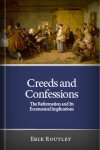
Creeds and Confessions: The Reformation and Its Ecumenical Implications
- Author: Erik Routley
- Publisher: Alec R. Allenson
- Publication Date: 1962
- Pages: 158
Erik Routley explores how Protestantism moved from understanding itself as a protest movement to engaging with other Christian movements. The stark division of Christianity caused by the Reformation was driven by a radical new understanding of the church. Early Protestantism was defined by its separation from Rome, but later generations were left to discover the ecumenical identity of the movement.
Erik Routley (1917–1982) was an English Congregationalist minister and professor of church music at Princeton. He was educated at Lancing, Magdalen, and Mansfield Colleges, Oxford. He wrote Congregational Praise, The University Carol Book, and the Summit Choir Book.
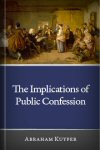
Famous theologian and politician Abraham Kuyper examines the relationship between outward confessions of faith—such as baptism, the Lord’s Supper, and repentance—and their implications for public life. Kuyper served as prime minister of the Netherlands and was a prominent Christian theologian. These experiences allow him to finely tune abstract theology to the realities of the modern world and the challenges it presents to a life of faith.
Abraham Kuyper (1837–1920) founded the Free University in Amsterdam and served as a professor of theology. At the invitation of B. B. Warfield, Kuyper traveled to the United States to deliver the Stone Lectures at Princeton. Kuyper studied at the University of Leiden, and received his doctorate there in 1863. He became a minister in the Dutch Reformed Church in 1863, and consistently called for the separation of church and state. He also led a secession from the Dutch Reformed Church and united several disparate Reformed churches in the Netherlands. Kuyper also led an active political life: he served in the Netherlands’ Parliament, and as prime minister from 1901 to 1905.
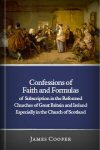
This volume reminds twenty-first century readers of the strength and direction the traditional Reformed creeds provide for Christian churches. Originally written to review the importance of adhering to traditional Reformed confessions in an era of increasing religious liberty, this volume shows the resilience of biblically based doctrine and the ability of confessions to guide churches at all times.
James Cooper (1846–1922) was professor of ecclesiastical history at the University of Glasgow. He served as minister at St. Stephen’s Church, Brought Ferry, and the East Parish of St. Nicholas, Aberdeen. He founded the Scottish Ecclesiological Society, and was a strong supporter of the reunification of all Presbyterian churches.
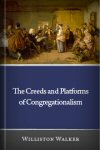
This rich collection of Congregationalist confessions and creeds is a unique expression of the Reformed tradition. Local Congregationalist churches and their ministers have the option to decide what beliefs to adopt from the creeds and confessions. The tradition’s unique polity allows flexibility, but it has a rich history of subscription to the basic doctrines and teaching of the Reformed tradition.
Williston Walker (1860–1922) was a church historian and professor at Yale. He was educated at Hartford Theological Seminary and Leipzig. He wrote A History of the Congregational Churches in the United States, Ten New England Leaders, The Reformation, and John Calvin.
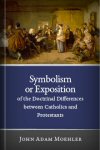
John Moehler’s book carefully describes and distinguishes the differing ways Lutherans, Catholics, and Reformed believers understand and express Christianity’s major doctrines. Moehler teases out major theological divergences, explains subtle differences, and zooms in on the biblical background for each doctrine, including sin, justification, the sacraments, and the church. Moehler also examines smaller movements such as the Anabaptists, Quakers, and Socinians.
John Adam Moehler. (1796–1838) was a Roman Catholic priest and professor of theology at Tübingen. His book Symbolik created significant controversy at Tübingen, bringing him into direct conflict with famous theologian F. C. Baur. He later taught at Munich, and was a significant influence on Henri de Lubac and Yves Congar.
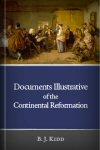
Intended as a companion to Documents Illustrative of English Church History, this volume is packed with the European Reformation’s most critical primary sources. It is an indispensable asset to any student of the Reformation.
B. J. Kidd(1864–1948) was an Anglican priest and church historian. He taught theology at Pembroke College and St. Catherine’s College. His most famous work is History of the Church to A.D. 461, which is distinguished by its exhaustive documentation. His other works include The Thirty-Nine Articles: Their History and Explanation, Documents Illustrative of the History of the Church, and The Continental Reformation.
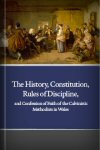
This volume provides access to the Reformed theological tradition typically understood to be Wesleyan. It sets forth the constitution, organization, rules of discipline, confession of faith, and short history of the Calvinistic Methodists of Wales as the church adopted them in 1828. Though the name of this movement will sound strange to modern readers, the documents contained in this book reveal the energy and doctrinal standards of an unparalleled expression of the Calvinist faith.
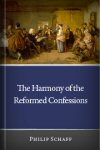
Eminent church historian Philip Schaaf demonstrates the continuity between the many Reformed confessions and creeds and relates them to the nineteenth century’s most pressing theological questions. Major theological issues include the doctrine of Scripture, anthropology, Christology, predestination, the sacraments, and a host of other issues. Schaff’s exposition on the confessions—originally presented as a lecture to the First General Presbyterian Council in 1877—is exemplary for its eloquence and clarity, making the most important theological concepts accessible to all readers.
Philip Schaff (1819-1893) was one of the most distinguished church historians who ever lived. He was educated at Tübingen, Halle, and Berlin, and was professor of church history and biblical literature at German Reformed Theological Seminary. When the Civil War forced the seminary to close, Schaff moved to Union Theological Seminary. Schaff had an enormous influence on German Reformed churches in America, and he wrote History of the Christian Church, Creeds of Christendom, and The Principal of Protestantism.
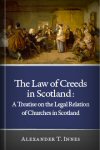
Discover how civil law in Scotland regulated the relationship between churches and their creeds in the nineteenth century. Written during a time of change in the ecclesiastical structures of the Church of Scotland and in the legal status of dissenting churches, The Law of Creeds in Scotland provides valuable insight into how churches can relate to changes in social behavior and to shifts in society’s worldview.
Alexander T. Innes (1833–1912) was a lawyer and church historian. He was educated at the University of Edinburgh and although he had reservations about the Westminster Confession of Faith, he continued to be a part of the Free Church of Scotland. He wrote multiple books on theology and law, including The Scotch Law of Establishment, John Knox, and Trial of Jesus Christ: A Legal Monograph.
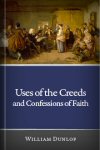
Learn how Reformed churches use creeds and confessions and why they’re important for worship in the church. Published posthumously, William Dunlop’s three part study on the role of formal confessions addresses their role in the life of the church, in the accountability of church leaders, and in the discipleship and education of believers. Dunlop also defends the creeds against opponents of formal confessions who accuse the creeds and confessions of empowering tyranny and the suppression of new knowledge.
William Dunlop (1692–1720) was a professor of divinity and church history at Edinburgh. Though he died young, his academic accomplishments were regarded as extraordinary. He wrote A Collection of Confessions of Faith, Catechisms, Directories, Books of Discipline and of Public Authority in the Church of Scotland and Sermons Preached on Several Subjects and Occasions.
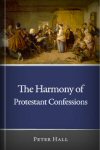
Understand how the various Reformed confessions harmonize with one another in their basic teaching. Peter Hall’s extensive study on the formal declarations of faith by various Reformed churches and groups examines the theological unity of this Protestant tradition, and demonstrates the remarkable tendency of these different confessions to cohere with and complement one another across three centuries.
Peter Hall was the rector of Milston, Wilts, and minister of Long-Acre Chapel, London. He wrote An Exposition upon the Two Epistle of the Apostle St. Paul to the Thessalonians and Abiding with the Church of Christ on Earth.
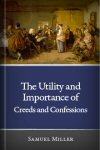
“Take heed to yourselves and your doctrine,” wrote the Apostle Paul to his protégé Timothy. In this volume, Samuel Miller follows Paul, impressing on church leaders the importance of the creeds and confessions in forming Christian character and protecting the integrity of the church. Miller provides instruction on how leaders should utilize public declarations of faith in their Christian devotion to build character, and how to employ them for the discipleship in the church.
Samuel Miller (1769–1850) was professor of ecclesiastical history and church government at Princeton Theological Seminary. He grew up in the Presbyterian Church and attended the University of Pennsylvania, where he earned his Doctor of Divinity. Miller was at the forefront of many of the controversies in the Presbyterian Church in America, such as the Old and New School controversies, and wrote many influential works dealing with the issues of the time, such as A Treatise on Mercersburg Theology and Infant Baptism Scriptural and Reasonable.
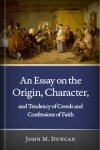
Pushing against the use of creeds in the churches, John Duncan’s volume answers pro-creedal argument by arguing that the creeds serve an unnecessary, limiting function that’s harmful to the life of the church. He explains how the creeds—despite being necessary and helpful in the past—have become problematic for the life of the church in the emerging modern world.
John M. Duncan (1790–1851) was pastor at Associate Reformed Congregation in Baltimore. He wrote A Discourse on the Official Relations of New Testament Elders, A Plea for Ministerial Liberty, and Lectures on the General Principles of Moral Government.
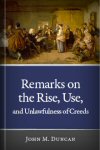
Taking his objection to creeds and confessions one step further, John Duncan argues that the creeds violate the spirit of freedom granted to believers in the New Testament. Though Duncan recognizes the need for doctrine, he believes doctrinal subscriptions should be minimal in scope and only reflect what the Bible teaches clearly.
John M. Duncan (1790–1851) was pastor at Associate Reformed Congregation in Baltimore. He wrote A Discourse on the Official Relations of New Testament Elders, A Plea for Ministerial Liberty, and Lectures on the General Principles of Moral Government.